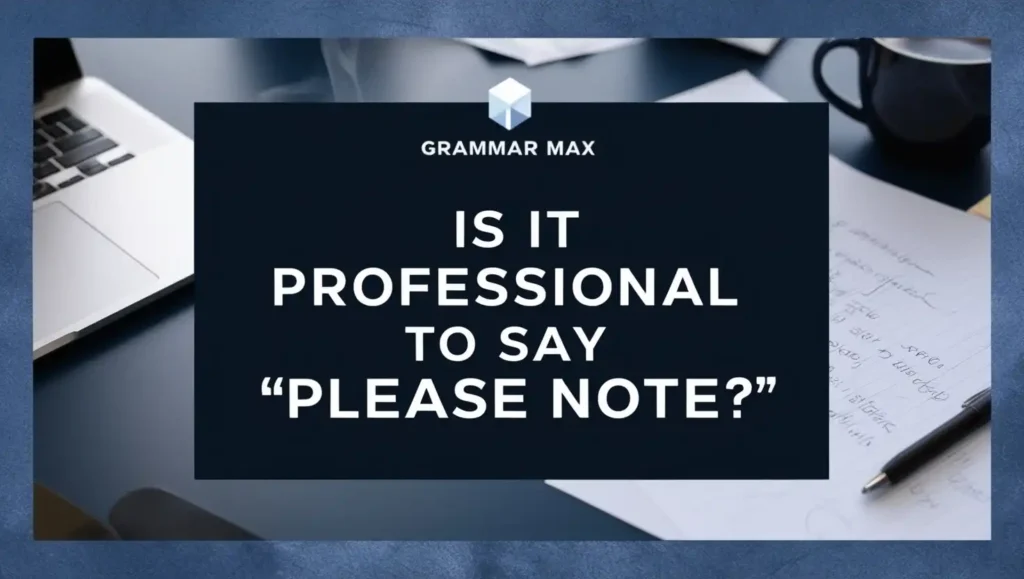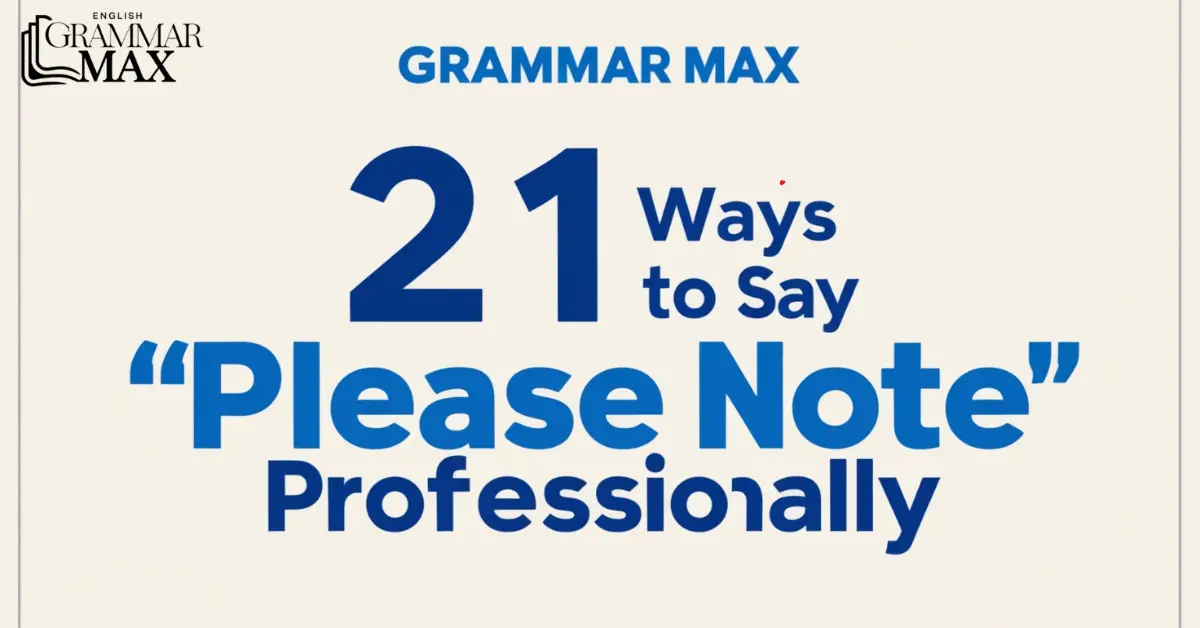In professional communication, it is crucial to convey essential information with clarity and precision. The phrase “Please Note” is frequently used in emails and business documents; however, there are various ways to express it depending on the tone and context. For example, whether you’re emailing colleagues, informing clients, or addressing important updates, using the appropriate phrasing not only ensures your message remains clear, but also upholds a respectful tone. Furthermore, in this article, we will explore 21 professional alternatives to “please note,” along with their practical applications and examples to illustrate how you can use them effectively in different scenarios.
Alternative Ways to Say “Please Note”

Here are 21 professional alternatives to “please note”:
- Kindly take note
- Please be aware
- For your attention
- It’s important to highlight
- Please be advised
- It’s crucial to note
- Be informed
- May I draw your attention to
- Please note for future reference
- It warrants attention
- Please take into consideration
- Please bear in mind
- I would like to point out
- Please keep in mind
- It’s essential to note
- Make sure you’re aware
- Take note of this
- You should be aware
- Please note the following
- It’s worth mentioning
- Take into account
1. Kindly Take Note
“Kindly take note” is a polite and formal way of drawing attention to important details. Use this phrase in emails or formal letters to request someone to acknowledge or remember something.
Scenario Example:
Subject: Upcoming Maintenance Schedule
“Dear team,
Kindly take note that the IT department will conduct system maintenance from 8 PM to 12 AM on Friday. Please ensure all necessary files are backed up beforehand.”
In this example, “kindly take note” politely informs the team of the upcoming event and requests their attention to specific details.
2. Please Be Aware
This phrase is often used when you want to alert someone to an important point or upcoming change. Additionally, “Please be aware” is another way to say “please note” in email communication. Moreover, using such alternatives can help maintain a professional tone while ensuring clarity in your message.
Scenario Example:
Subject: Policy Update
“Dear Alice,
Please be aware that starting next week, all requests for time off must be submitted through the new HR portal.”
This phrase emphasizes the need for the recipient to be aware of the new policy.
3. For Your Attention
“For your attention” is a formal expression used to direct the recipient’s focus to a specific point. This is particularly useful when conveying critical information.
Scenario Example:
Subject: Urgent: Updated Client Meeting
“Dear Mr. Johnson,
For your attention, the client meeting has been rescheduled to Thursday at 10 AM.”
Here, the phrase helps to highlight the significance of the update, ensuring it is seen as a priority.
4. It’s Important to Highlight
When something needs emphasis, you can use the phrase “It’s important to highlight” to stress the importance of the information you’re sharing. In addition, this phrase helps draw attention to key points, ensuring that the recipient fully understands the significance of the message. Moreover, it adds a sense of priority to the information, making it stand out in professional communication.
Scenario Example:
Subject: Product Launch Instructions
“Dear Team,
It’s important to highlight that all promotional materials must receive approval from the marketing department before distribution.”
This usage accentuates the necessity of following specific procedures.
5. Please Be Advised
This formal expression commonly appears in official communication. “Please be advised” suits informing someone of a significant change or update.
Scenario Example:
Subject: Changes in Office Hours
“Dear Employees,
Please be advised that starting next Monday, office hours will shift from 8:30 AM to 9:00 AM.”
This phrase serves as a great please note synonym in email notifications.
6. It’s Crucial to Note
When something is of utmost importance, for instance, “It’s crucial to note” serves as an excellent alternative to emphasize the critical nature of the information. Furthermore, this phrase highlights the urgency and significance, making sure the recipient understands the importance of the details being shared.
Scenario Example:
Subject: Compliance Training
“Dear Staff,
It’s crucial to note that all employees must complete the compliance training by the end of the month to ensure legal adherence.”
This statement underscores the urgency of compliance.
7. Be Informed
“Be informed” succinctly alerts someone to specific details. Use this to notify someone of new information without being overly formal.
Scenario Example:
Subject: New Company Policy
“Dear Mary,
Be informed that a new remote working policy has been implemented, effective immediately.”
This phrase serves as a professional alternative to please note while keeping the tone polite.
8. May I Draw Your Attention to
A respectful and polite phrase, “May I draw your attention to” politely requests someone to focus on a specific detail or issue.
Scenario Example:
Subject: Project Deadline Reminder
“Dear Thomas,
May I draw your attention to the approaching project deadline of Friday, October 15? Please ensure all documents are submitted by 5 PM.”
This phrase gently emphasizes the need for timely action.
9. Please Note for Future Reference
This phrase works well when you provide information that might not be immediately relevant but will be useful later. It is especially common in professional documentation.
Scenario Example:
Subject: HR Policy Reminder
“Dear Team,
Please note for future reference that all medical leaves should be reported within 48 hours of the absence.”
It’s a great way to ensure important information is acknowledged for later use.
10. It Warrants Attention
This formal phrase is useful when you want to communicate that something requires immediate focus. It assertively draws attention to significant details.
Scenario Example:
Subject: Urgent System Update
“Dear IT Staff,
It warrants attention that the security patch needs installation on all computers by the end of the day to prevent data breaches.”
This phrase stresses the importance of acting quickly.
11. Please Take Into Consideration
When you want someone to reflect on a specific aspect, “Please take into consideration” works well in professional writing, especially in negotiations or recommendations.
Scenario Example:
Subject: Budget Proposal Review
“Dear Ms. Smith,
Please take into consideration the increase in raw material costs when reviewing the budget proposal for next quarter.”
This phrase invites careful thought and consideration.
12. Please Bear in Mind
“Please bear in mind” politely reminds someone of relevant information, especially when it relates to future actions or decisions.
Scenario Example:
Subject: Delivery Schedule
“Dear Mark,
Please bear in mind that all shipments must process by 4 PM to meet our client’s delivery expectations.”
This expression softly reinforces a reminder.
13. I Would Like to Point Out
When you need to emphasize a particular point in a conversation or email, “I would like to point out” helps draw the recipient’s attention to specific details.
Scenario Example:
Subject: Sales Report Clarification
“Dear Jenna,
I would like to point out that the Q3 sales figures reflect an increase due to the new marketing strategy, not an error in data entry.”
This phrase accentuates the need for clarification.
14. Please Keep in Mind
Similar to “please bear in mind,” this phrase ensures that the recipient remembers a key point.
Scenario Example:
Subject: Important Travel Update
“Dear John,
Please keep in mind that your travel expenses must be submitted within one week of returning from business trips.”
This reminder helps to highlight essential details.
15. It’s Essential to Note
When dealing with critical information, “It’s essential to note” provides a strong and professional way to draw attention to key facts.
Scenario Example:
Subject: Health and Safety Guidelines
“Dear Employees,
It’s essential to note that all safety protocols must be followed at all times to ensure workplace safety.”
This phrase emphasizes the necessity of compliance with important rules.
16. Make Sure You’re Aware
This is a slightly less formal way to ensure the recipient is notified of important information.
Scenario Example:
Subject: Software Update Reminder
“Dear David,
Make sure you’re aware that the latest software update will roll out tomorrow. Please save all your work by 5 PM.”
This expression is straightforward and effectively communicates the message.
17. Take Note of This
A simple and direct phrase, “Take note of this” ensures that the recipient acknowledges the importance of the message.
Scenario Example:
Subject: New Workflow Process
“Dear Colleagues,
Please take note of the new workflow process that will implement starting next week.”
This phrase effectively communicates updates efficiently.
18. You Should Be Aware
When you need to inform someone of important information, especially if it’s something they might not yet know, “You should be aware” politely communicates the necessary details.
Scenario Example:
Subject: Upcoming Deadline
“Dear Emma,
You should be aware that the deadline for the quarterly report has been moved up to the 10th of the month.”
This phrase is useful for making sure the recipient knows something important.
19. Please Note the Following
When listing items or providing instructions, “Please note the following” is a great way to introduce information clearly.
Scenario Example:
Subject: Meeting Agenda
“Dear Team,
Please note the following agenda points for tomorrow’s meeting: 1. Project Updates, 2. Budget Review, 3. New Assignments.”
This phrase is ideal for structured communication.
20. It’s Worth Mentioning
This phrase is often used when the information might not seem urgent but still deserves attention.
Scenario Example:
Subject: Optional Training Session
“Dear
Team,
It’s worth mentioning that an optional training session on the new software will be held this Friday at 2 PM.”
This implies that while the information is not critical, it still warrants attention.
21. Take Into Account
“Take into account” is a great phrase to use when you want someone to consider specific information while making decisions or assessments. It often appears in professional settings where careful thought or evaluation is required.
Scenario Example:
Subject: Budget Planning for Next Quarter
“Dear Finance Team,
Please take into account the increase in operational costs when drafting the budget for the upcoming quarter. This adjustment will be crucial for accurate forecasting.”
This phrase works well in formal contexts where consideration and attention to detail are necessary for decision-making.
When to Use These Phrases ?
Use these phrases when you need to draw attention to critical information, highlight key points, or ensure important details are acknowledged in professional communication. They are ideal for emails, reports, or formal letters, helping to inform or notify recipients clearly while maintaining a courteous and professional tone.
Is it Professional to Say “Please Note”?

Yes, it is professional to say “Please note,” especially when you need to highlight important information or direct someone’s attention to specific details. However, overusing the phrase can make communication seem repetitive or blunt. Therefore, to maintain a more polished tone, it’s beneficial to use alternatives that convey the same message while sounding more varied and refined. Additionally, using different phrases helps keep your communication engaging and professional. Phrases like “Kindly take note” or “Please be advised” are more formal and can enhance the professionalism of your communication, ensuring it remains respectful and engaging.
Frequently Asked Questions
How do you politely say “please note”?
You can say “Kindly take note,” or “Please be aware,” to politely emphasize important details.
What can I use instead of “please note”?
Use “It’s important to highlight,” or “Please be advised” as alternatives for a professional tone.
What is another way to say kindly note?
Try using “Please be informed,” or “Take into account.”
Is it formal to say “please note that”?
Yes, “please note that” is formal and appropriate for professional communication.
Conclusion
Whether you’re sending an email, writing a formal letter, or preparing a business report, using the right phrase to say please note professionally is crucial for ensuring your message is clear and respectful. From “please be advised” to “it’s crucial to note,” each phrase has its unique tone and context, making them ideal for different scenarios. Now you have 21 alternatives and various ways to say please note that you can use to sound both professional and courteous in your communication.

William Henry is a writer for Grammar Max, a blog that focuses on synonyms and phrases. He loves exploring the quirks of the English language and enjoys helping readers improve their vocabulary. William’s articles are easy to read, fun, and full of useful tips for anyone looking to better understand and use English. Whether you’re a student, a professional, or just someone interested in language, William’s writing on Grammar Max makes learning about words and their meanings simple and enjoyable.















